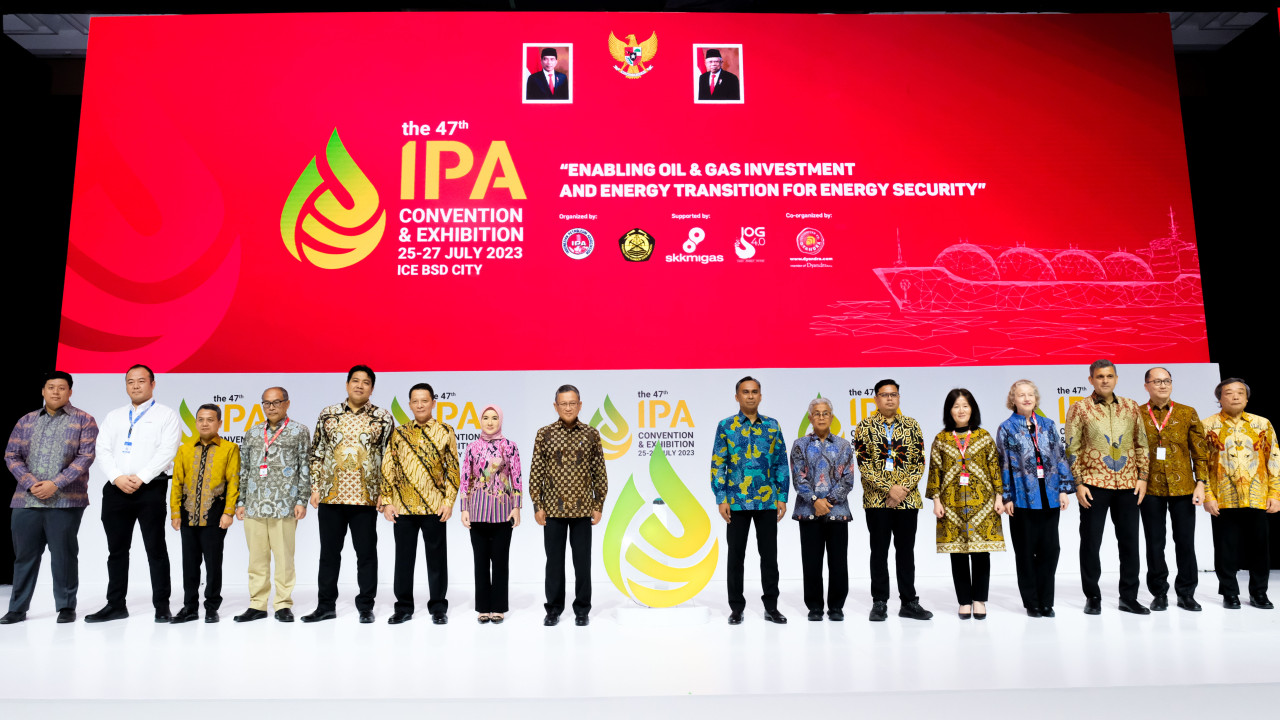CCS/CCUS, Oil and Gas Industry Solutions to Face the Energy Transition Era
JAKARTA - The Indonesian Petroleum Association (IPA) is holding the 47th IPA Convention and Exhibition at ICE, BSD City on 25-27 July 2023, themed “Enabling Oil & Gas Investment and Energy Transition for Energy Security”. This grand event was attended by stakeholders in the oil and gas industry and was officially opened by the Minister of Energy and Mineral Resources, Arifin Tasrif.
In his opening speech, Arifin Tasrif affirmed the importance of implementing Carbon Capture Storage (CCS) and Carbon Capture Utilization and Storage (CCUS) technologies. Moreover, this year the government has issued new regulations regarding the implementation of CCS/CCUS in the oil and gas business. This regulation is necessary considering that the national oil and gas industry is facing dual challenges, namely meeting energy needs and reducing carbon emissions.
“The regulation describes CCS and CCUS as promising technologies to reduce carbon emissions in order to achieve the Net Zero Emissions (NZE) target by 2060 or sooner,” he said.
Currently, there are 15 CCS/CCUS projects in progress in Indonesia. Among them, Gundih's CCUS/ Enhanced Gas Recovery (EGR) in Central Java and Sukowati's CCUS/ Enhanced Oil Recovery (EOR) in East Java. Another project that will soon be implemented is the Tangguh CCUS, targeted to reduce carbon emissions by 25 million tons of CO2 and increase gas production up to 300 BSCF in 2035. “This project is marked to be onstream in 2026,” said Arifin.
Arifin added, oil and gas will certainly remain important elements in the energy transition era. Based on data from the BP Statistical Review, in response to world energy needs, world oil production has increased from 88.6 million barrels per day (bpd) in 2012 to 93.8 million bpd in 2022. Meanwhile, gas production has also increased by around 20% in the last 10 years with average gas consumption increasing by 1.7% per year.
The data shows the important role of the oil and gas sector in meeting affordable energy needs, especially for the transportation and industrial sectors driven by economic growth, especially in developing countries, including Indonesia.
He added, energy security is not only about the certainty of energy supply and affordability but must also be sustainable and low in carbon emissions.
According to Arifin, there are several ways to ensure the upstream oil and gas industry’s growth to meet demand while, at the same time, playing a role in carbon emissions reduction efforts. Efficient use of energy to reduce greenhouse gas emissions in operational activities is the easiest way available to business actors.
“Besides, there is also an option to reduce exhaust gas, regulate methane gas emissions and, in parallel, increase the use of low-carbon power plants utilizing new, renewable energy sources. The next step is to increase the use of gas, initiate the use of efficient technology, and develop low-carbon mobility, such as the use of electric vehicles, biofuels, and LNG,” said Arifin.
Arifin also explained the importance to encourage the development of hydrogen. According to him, hydrogen technology will answer the challenges of a low-carbon emission industry in the future. This is supported by the capabilities of the oil and gas industry which has the experience and qualification to develop and produce hydrogen.
Yuzaini Md Yusof, President of IPA in his remarks said that Indonesia is one of the countries moving quite fast in implementing CCS/CCUS, including by issuing Minister of Energy and Mineral Resources Regulation No 2/2023 concerning CCS/CCUS in the upstream oil and gas industry. Going forward, several things that must be prepared are fiscal policies, tax credits, and carbon price policies as well as preparedness of the carbon storage facilities.
"Even though the CCS/CCUS projects have started development, there are still many high-risk projects requiring further regulatory support. With the success of the CCS/CCUS projects mainly still depending on regulatory support and commercial attractiveness, of course there is still a lot of work to be done," explained Yuzaini.
The IPA Convex 2023 is held for three days from Tuesday (25/7/2023) to Thursday (27/7/2023), Indonesian Petroleum Association as organizer and Dyandra Promosindo as co-organizer.
The IPA Convex is made possible by the support of a number of partners and sponsors, including PT. Pertamina Hulu Energi as the Titanium sponsor; MedcoEnergi, Elsewedy Electric, COSL, BP Indonesia, Wood Mackenzie, PETRONAS Indonesia, and ExxonMobil Indonesia as Platinum sponsors; Energi Mega Persada and Mubadala Energy as Gold sponsors; and Conrad Asia Energy Ltd, Sinopec International Petroleum E&P Corporation (SIPC) Indonesia, Chevron, Harbor Energy, and INPEX MASELA LTD as Silver sponsors. (**)


